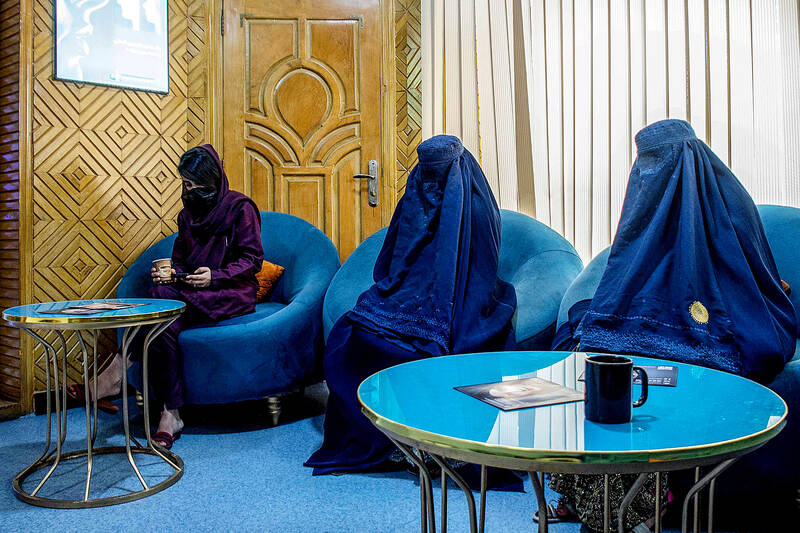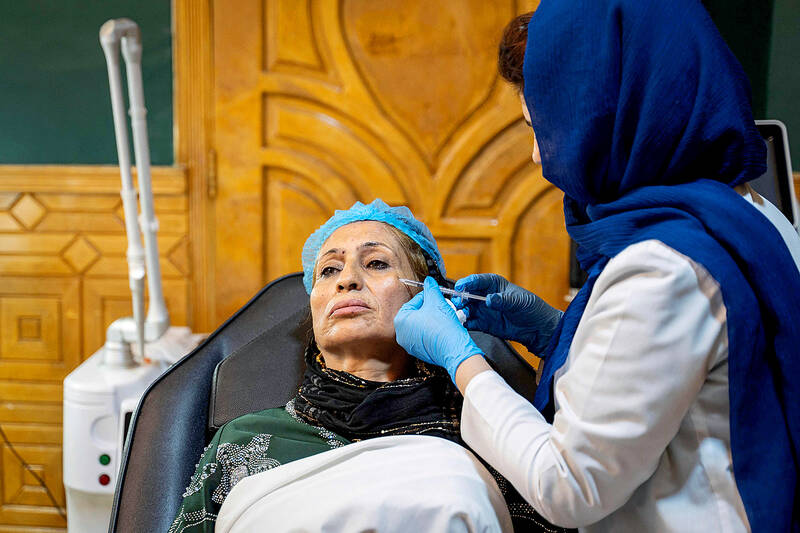Decked out with fake crystal chandeliers and velvet sofas, cosmetic surgery clinics in Afghanistan’s capital are a world away from the austerity of Taliban rule, where Botox, lip filler and hair transplants reign.
Despite the Taliban authorities’ strict theocratic rule, and prevailing conservatism and poverty in Afghanistan, the 20 or so clinics in Kabul have flourished since the end of decades of war in the country.
Foreign doctors, especially from Turkey, travel to Kabul to train Afghans, who equally undertake internships in Istanbul, while equipment is imported from Asia or Europe.

Photo: AFP
In the waiting rooms, the clientele is often well-off and includes men with thinning hair, but the majority are women, sometimes heavily made up and always covered from head to toe, more rarely in an all-enveloping burqa.
At 25, Silsila Hamidi decided to get a second facelift, convinced her skin had suffered from the stress of being a woman in Afghanistan.
“Even if others can’t see us, we see ourselves: looking beautiful in the mirror gives us energy,” said Hamidi, before she went under the knife to lift the upper part of her face, which “was starting to sag.”

Photo: AFP
Skirting details, the medical school graduate said that her skin suffers from the “many pressures” faced by Afghan women.
Under Taliban government restrictions, women’s access to work has been severely constrained. They can no longer travel long distances without a male guardian, must not raise their voices outside the home, and are banned from universities, parks and gyms.
While surgical cosmetic interventions might be booming, hair salons and beauty parlors catering to women have been banned.
“If they were open ... our skin wouldn’t be in this state, we wouldn’t need surgery,” said Hamidi, who, at 23, had work done on the lower part of her face.
The Taliban authorities, who ordinarily forbid altering physical characteristics, did not reply for multiple requests for comment on cosmetic surgery.
Those in the sector said it is allowed as it is considered medicine.
The government does not interfere with their work, clinic workers told reporters, but morality police check that sex segregation is respected: a male nurse for a male patient, a female nurse for a female patient.
Some said that even Taliban members are clients.
“Here, having no hair or beard is considered a sign of weakness,” said Sajed Zadran, deputy director of the Negin Asia clinic, which boasts state-of-the-art Chinese-made equipment.
Since the Taliban ordered men to grow their beards at least the length of a fist, transplants have become fashionable, said Bilal Khan, codirector of the EuroAsia clinic, which is about to open a second facility.
And because not all clients are wealthy, some “borrow money to have hair before their wedding,” Khan said.
In the four-story villa transformed into a clinic, the methods are the same as those used abroad and pose “no risk,” said Abdul Nassim Sadiqi, a dermatologist.
At his clinic, it costs US$43 to US$87 for Botox and US$260 to US$509 for hair implants.
The sums are a fortune for many Afghans — nearly half of whom live in poverty, according to the World Bank — but a boon for those like Mohammed Shoaib Yarzada, an Afghan restaurateur based in London.
Put off by the thousands of pounds required in Britain for the same operation, he took advantage of his first visit to Afghanistan in 14 years to have his scalp replenished.
“When I enter the clinic, it’s as if I am abroad, in Europe,” he said.
To attract new customers, each clinic floods its social media pages with promises of beauty: smoothed skin, plump lips and abundant hair.
Afghanistan, like the West, is not exempt from the sway of social media influencers, said Lucky Khaan, 29, codirector of Negin Asia, which registers dozens of new patients every day.
“Many patients come without real problems, but want to have surgery because they have seen trends on Instagram,” said Khaan, a Russian doctor of Afghan origin, whose face is wrinkle-free.
While according to the UN, 10 million Afghans suffer from hunger and one in three lacks access to basic medical care, some, “who lack money for food, prefer to invest in their beauty,” the surgeon said.

Auschwitz survivor Eva Schloss, the stepsister of teenage diarist Anne Frank and a tireless educator about the horrors of the Holocaust, has died. She was 96. The Anne Frank Trust UK, of which Schloss was honorary president, said she died on Saturday in London, where she lived. Britain’s King Charles III said he was “privileged and proud” to have known Schloss, who cofounded the charitable trust to help young people challenge prejudice. “The horrors that she endured as a young woman are impossible to comprehend and yet she devoted the rest of her life to overcoming hatred and prejudice, promoting kindness, courage, understanding

Tens of thousands of Filipino Catholics yesterday twirled white cloths and chanted “Viva, viva,” as a centuries-old statue of Jesus Christ was paraded through the streets of Manila in the nation’s biggest annual religious event. The day-long procession began before dawn, with barefoot volunteers pulling the heavy carriage through narrow streets where the devout waited in hopes of touching the icon, believed to hold miraculous powers. Thousands of police were deployed to manage crowds that officials believe could number in the millions by the time the statue reaches its home in central Manila’s Quiapo church around midnight. More than 800 people had sought

‘DISRESPECTFUL’: Katie Miller, the wife of Trump’s most influential adviser, drew ire by posting an image of Greenland in the colors of the US flag, captioning it ‘SOON’ US President Donald Trump on Sunday doubled down on his claim that Greenland should become part of the US, despite calls by the Danish prime minister to stop “threatening” the territory. Washington’s military intervention in Venezuela has reignited fears for Greenland, which Trump has repeatedly said he wants to annex, given its strategic location in the arctic. While aboard Air Force One en route to Washington, Trump reiterated the goal. “We need Greenland from the standpoint of national security, and Denmark is not going to be able to do it,” he said in response to a reporter’s question. “We’ll worry about Greenland in

PERILOUS JOURNEY: Over just a matter of days last month, about 1,600 Afghans who were at risk of perishing due to the cold weather were rescued in the mountains Habibullah set off from his home in western Afghanistan determined to find work in Iran, only for the 15-year-old to freeze to death while walking across the mountainous frontier. “He was forced to go, to bring food for the family,” his mother, Mah Jan, said at her mud home in Ghunjan village. “We have no food to eat, we have no clothes to wear. The house in which I live has no electricity, no water. I have no proper window, nothing to burn for heating,” she added, clutching a photograph of her son. Habibullah was one of at least 18 migrants who died